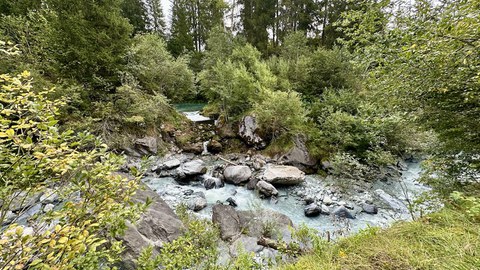Aug 05, 2025
TU Dresden joins ERASMUS+ project to strengthen nature-based solutions in water sector

Nature-based solutions play a crucial role in the water cycle
Over the next three years, TUD will work together with Vrije Universiteit Brussel (VUB) and University of Ljubljana (UL) to develop and promote innovative approaches to address hydroclimatic risks such as floods, droughts, and water quality issues across Europe―with a particular focus on nature-based solutions (NbS) and their digital support.
TUD‘s contribution to research, practice and citizen participation
TUD provides its extensive expertise in hydro and environmental sciences and leads the work package on “Community Engagement for NbS Implementation.” The aim is to actively involve citizens, municipalities, and decision-makers in the development and implementation of nature-based solutions (NbS). This includes:
- Development of citizen science programs for environmental monitoring using mobile tools,
- Organization of training workshops for municipalities, NGOs, and industry stakeholders,
- Providing digital learning resources and interactive platforms to raise awareness of NbS,
- Stakeholder dialogues to integrate NbS into local and regional planning processes.
TUD is also involved in the development of AI-powered predictive models, IoT-based monitoring systems, and GIS-supported decision-making tools.
Embedded in the EUTOPIA Connected Community
NbSWISE is being implemented as part of the EUTOPIA Connected Community “Digitisation for Hydro-Climatic Risk Reduction”, which focuses on digital transformation in environmental resilience. TUD will contribute its long-standing expertise in groundwater management, risk assessment, and sustainable resource use. The collaboration builds on existing partnerships within the Erasmus Mundus programme and the EUTOPIA University Alliance.
Impact and outlook
The project runs from September 2025 to August 2028. During this time, pilot sites will be operated in Belgium, Germany, and Slovenia. NbSWISE will not only generate new scientific insights but also develop practical tools and educational resources that are intended to be sustainably integrated into teaching, administration, and society. The results will feed into open learning platforms, digital dashboards, and scientific publications. TU Dresden will play a central role in this process―both in research and in on-the-ground implementation.
More information
Contact
 © CS
© CS
Head of Research Group INOWAS
NameDr. Catalin Stefan
Projects: AGREEMAR, FARM, R-MAR
Send encrypted email via the SecureMail portal (for TUD external users only).
Research Group INOWAS
Research Group INOWAS
Visiting address:
Pratzschwitzer Str. 15, Room 210b
01796 Pirna
